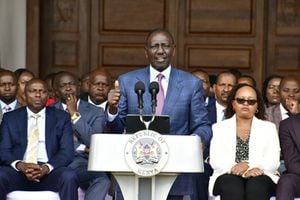Prime
Does a ‘scientific’ election meet the free and fair test?
Let me start by stating the obvious - these are extraordinary times that demand extraordinary measures. Covid-19 has changed the world as we know it. With its spread, travel has shrunk and our only access to the outside world is via the media.
From banking and entertainment to political deliberations, everything has become mostly digital. Before Covid-19, we used to spend evenings with friends but now we are huddled in our homes talking to family members, chatting on phone, plugged into our laptops and tablets or glued to our televisions where leaders decree ever more restrictive measures in every sphere of our lives.
The government is now on the horns of a dilemma - do you postpone elections and be accused of undermining democracy or do you proceed with full-blown campaigns and put the populace at risk and be damned for their deaths? Or do you hold an election where some of the most dramatic and effective means of mass mobilisation are outlawed and be accused of precipitating an unlevel electoral terrain?
I’m asking these questions because I understand the difficulties facing Justice Simon Byabakama and the Electoral Commission (EC). I think the EC has chosen the least worst of the options available.
Of all the considerations in determining this matter, the provisions of the Constitution are key.
The deadline by which general elections must be held are set by the Constitution. This is non-negotiable except where a state of emergency is declared by the President with the approval of Parliament.
In the absence of a state of emergency, the hands of the EC are tied. They have to make the best of a bad situation that is not only unprecedented, but unexpected.
The EC failed in its duty by adopting a decision-making process that excluded key stakeholders, particularly the political parties that sponsor the overwhelming majority of candidates. I’m sure many useful and constructive recommendations would have been made to enrich the revised roadmap and regulations of campaigns dictated by the coronavirus pandemic.
A proper decision-making matrix makes room for external recommendations, the solicitation of input from stakeholders and the persuasion of those whose agreement and buy-in is critical for the successful implementation of any decision.
Consequently, the elements of restrictive elections unless adjusted through broader consultations are unacceptable because they don’t pass the test of free and fair elections.
Mass rallies may be imprudent and risky but smaller meetings, where standard operating procedures to prevent the spread of Covid-19 are enforced, should be allowed. The purpose of an election is to ensure the free expression of the will of the people.
A free, fair and credible election is transparent, inclusive, and accountable. It ensures equal opportunities for all actors to compete. That is why electoral laws provide for important process-related obligations on the part of all actors and also guarantee key rights and freedoms.
The entire process should be easily understood and open to scrutiny and the results should be independently verifiable and auditable.
The independence of the EC is questionable because of how the members are appointed. The previous conduct of the EC has proved that their allegiance is more to the President and the government of the day than to the Constitution and the people. EC officials have been faulted of bias, unequal and unfair treatment of candidates by the courts of law.
In the circumstances, the EC should urgently engage all stakeholders to ensure that even in the absence of mass rallies, candidates can be accorded equal access to media houses. Money can also be saved by holding the election on the same day provided the polling stations are made smaller.
The EC is right to assert its independence but that doesn’t mean it is isn’t accountable to the public!




